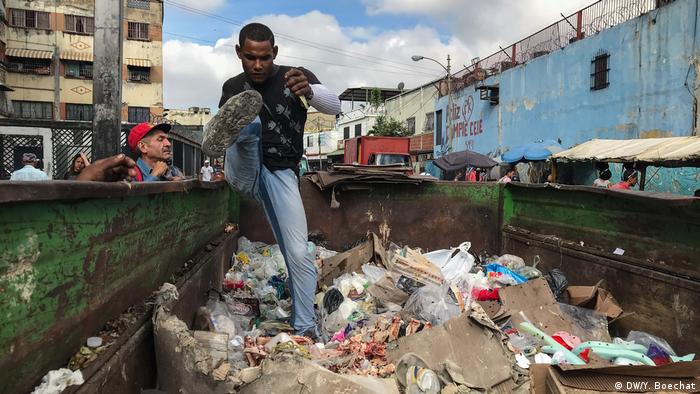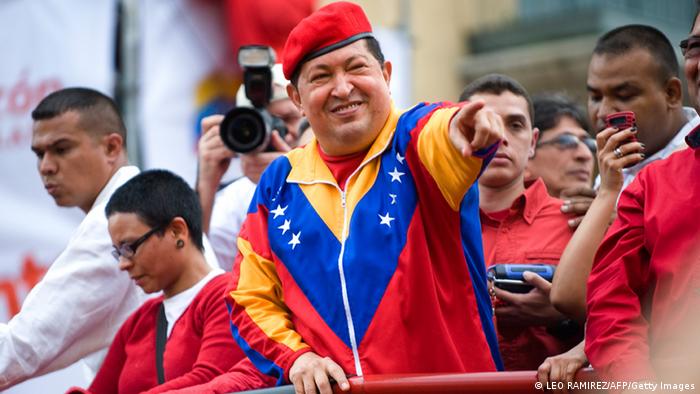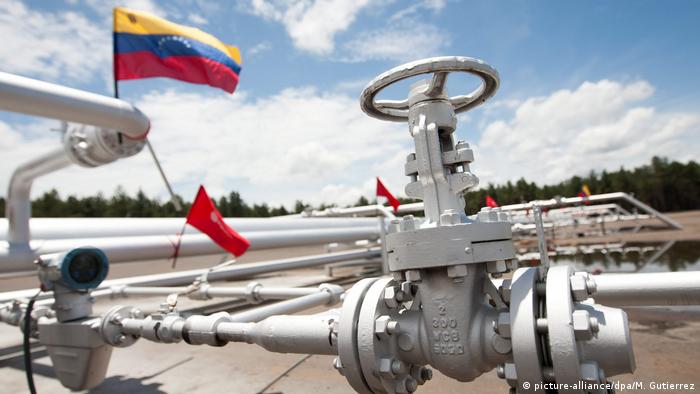How can it be that a country like Venezuela with the biggest oil reserves in the world is in such a deep crisis? The political scientist Stefan Peters delivers in the DW-Interview multiple answers.

Deutsche Welle: Is the Oil in the whole Disaster in Venezuela to blame? You quote in your new book, “socialism of the 21st century. Century in Venezuela – the rise and fall of the Bolivarian Revolution of Hugo Chávez”, one of the founding fathers of OPEC, Juan Pablo Pérez Alfonso. He says: “We are drowning in the excrement of the devil”, referring to the oil. He has to be right?
Stefan Peters: The oil itself is probably not to blame. There are people and companies that deal with the oil wealth. So, it’s not the oil itself, but about what you do with the revenue. We should speak not so much of a blessing or a curse, what is done very often, but questions of which social groups are the winners and which the losers in the distribution of oil revenues.
When you speak of winners and losers – what is actually wrong with it, that the poorer sections of the population benefit from the revenues from the oil?
Nothing, it is even absolutely necessary, especially in countries such as Venezuela, but also, for example, in the Region of sub-Saharan Africa. We have in these countries, serious social problems and need to be edited. The question is rather: “Has indeed benefited in Venezuela in the first line, the poor population of them?” and secondly: “How can you manage an economy reduces the dependence on a single or a few raw materials?”

Political Scientist Stefan Peters
And if you need to answer your first question for Venezuela, you would say: “no, not the poorer strata of the population, but a small Elite has benefited from it?”
As far as I would go. Approximately from 2003, when oil prices rose and in Venezuela the government of Hugo Chávez, thus, more revenue has had, has certainly benefited the poor population, no question about it. For example, through social programs or through certain other subsidies. But it would have benefited the middle class and large parts of the relatively narrow Elite. I call this “Elevator effect” – the whole society goes up, but the social Situation has changed little. But elevators go not only upwards, but also downwards. And then the situation suffer in such a crisis as now in Venezuela, most of the poorer sections of the population that has the opportunity, from the Elevator to get out.
We continue the example with the Elevator: The Elevator is shut down, because the price of oil suddenly dropped again?
Exactly. Other countries had to live with it and are in crisis situations, because the price of oil has fallen. In Venezuela, the flow rates are significantly decreased. And in a country where there are no other legs is a huge Problem – if the oil prices drop, the flow rates also go back and, consequently, the exports are lower and there is actually no alternative export products. The corruption – that many of the receipts in opaque channels percolate.

President Hugo Chávez ruled Venezuela from 1999 until his death on August 5. March 2013
If we now turn again back in time and imagine you were the adviser of Hugo Chavez: What would you have advised him at that time?
It must always be to diversify the economy. In fact, Chavez has implemented reforms, such as the promotion of smaller businesses, the strengthening of the agriculture or the introduction of a land reform. The has not but borne fruit, because not enough incentives have been created to increase productivity. And this productivity is of course a crucial point. In the case of a self as a socialist telling the government you would think that this designed the tax policy on progressive. But this has been neglected, as well as other stand legs is to build and strengthen. You didn’t need all of that because enough money was from oil revenue.
The policy of the Hugo Chávez was, therefore, not sustainable?
No, she wasn’t. However, there is this debate since 1936, when it was said: “The petroleum to reap the rewards of development”. And the country will fail again and again. It seems to be only to Hugo Chávez or Nicolás Maduro, that the work, that is not also managed to the other Predecessors in Venezuela. And if we look in other countries, after Saudi Arabia, for example, or to the other Arab States of the Gulf, there have been many attempts to solve the one-sided emphasis on petroleum. And even there it has failed again and again, and, as far as I lean out of the window, it will fail again. And the question is: Why is this so? In my opinion, is just so much money in the oil business since that painful reforms, or the reversal of oil are in fact not necessary at all.
They come in your book to the conclusion, that the Bolivarian Revolution has failed.
It is economically a failure. There is no economic Basis, Venezuela is as dependent on oil as never before in its history. The social Situation is dramatic. The hoped-for successes, which there were, temporarily, were not sustainable. And also the political goals have not been met, to combat the corruption, the Clientelism and a direct democracy, all of this is not succeeded. There is also a strong authoritarian tendencies within the government. Also with flowery words propagated by Eco-socialism is a failure. As a territory of the size of Cuba, where a number of rich minerals store is just under very dubious environmental and social conditions are liable to be exploited. And investment conditions for foreign corporations that would dare to do so is probably not a neo-liberal government.

The one-sided fixation on oil has been Venezuela’s undoing
Do you think that a country with oil reserves such as Venezuela will eventually be a rich country? And if Yes, how long this will take?
To strive to return to the picture from the Elevator: at some point, the Elevator goes back up. This cyclic development of strong boom phases, and the deep crises it is actually really typical for such oil countries. The crisis, however, is actually the most severe in the history of the country, when the country gets back on its feet, is not currently in sight. And I don’t think there would be a change of government, a rapid improvement. Juan Guaidó and the Oppostion want to put in the end, the crisis-prone model. With a much greater Opening to private companies in the oil sector, but without a rupture with the logic to focus primarily on raw materials, in particular oil.
What you should do Venezuela instead?
It needs to have a serious discussion about how you can’t design a development model based only on oil or other commodities, but very much wider than the other. This will not happen from today to tomorrow, that is perfectly clear. But there is a fundamental debate is necessary, as you can see from this dependency. In Venezuela and in other countries with large oil reserves.
The conversation with Oliver Pieper.
Professor Stefan Peters heads for almost a year, the German-Colombian Institute of Peace CAPAZ in Bogotá. The latest book by the political scientist: “socialism of the 21st century.Century. The rise and fall of the Bolivarian Revolution of Hugo Chávez”.